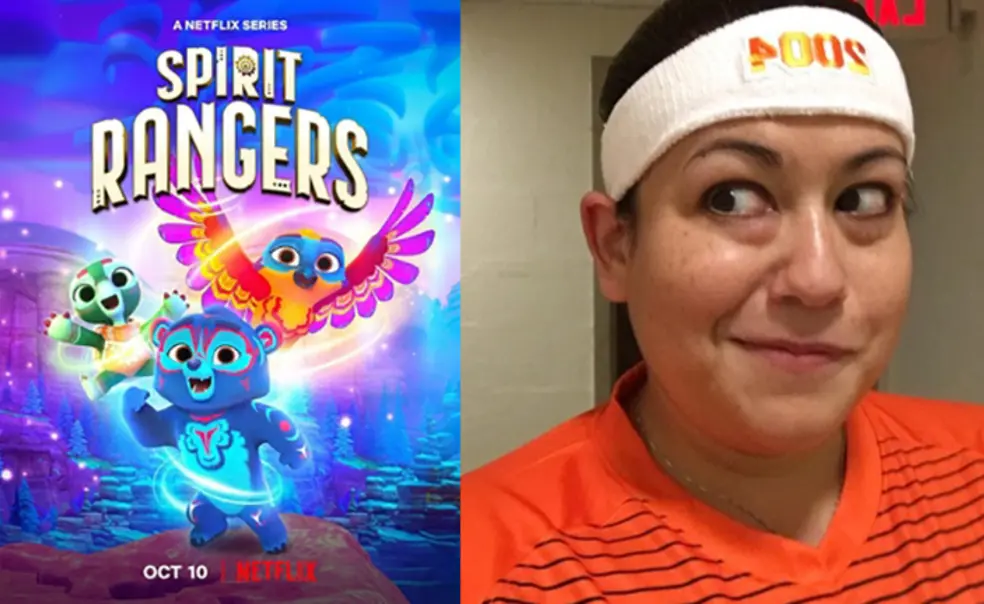Carlee Malemute ’04 Is Bringing Native Perspectives to Hollywood
‘It’s important for kids to get to see themselves on TV, and to see that there is no single, stereotypical way to be Native’
Growing up as an Athabaskan child in rural Alaska, Carlee Malemute ’04 had few mainstream cultural icons to look up to. She watched Lifetime movies and television, but never saw faithful representations of her people.
“Hollywood tends to make stories about us without us,” says Malemute, who was raised in Galena, a village of 500 on the Yukon River accessible only by plane. “Pocahontas was on when I was a kid. And I would watch it and think, ‘Um, that’s not right. That’s not the version I know.’”
Now Malemute is in Hollywood, and she’s telling different kinds of stories. As a writer for Spirit Rangers, an animated Netflix preschool series about, and written and produced by, Native Americans, Malemute has worked to give the next generation something she never had.
“I think it’s important for kids to get to see themselves on TV, and to see that there is no single, stereotypical way to be Native,” says Malemute. “My nephew is watching Spirit Rangers. That’s been very exciting for me.”
Spirit Rangers follows multitribal siblings Kodi, Summer, and Eddy Skycedar as they try to protect a California National Park by making voyages into a different dimension called the “Spirit Park.” There they transform into a grizzly bear cub, a red-tailed hawk, and a turtle, respectively, to complete missions. Along the way, they learn life lessons based on stories from different indigenous cultures.
“Native history has a very strong oral storytelling tradition,” says Malemute. “There are almost always morals or lessons, which translates very well to preschool animation.”
One of the deep lessons the show imparts is humankind’s responsibility to engage responsibly with the natural world. The show foregrounds nonhuman characters and the health of the land itself.
“We wanted kids to learn that everything they do affects the land, and that the land affects them,” says Malemute. “I think that’s an important thing for kids to see from an early age, and it’s a natural part of Native tradition.”
The show’s creator, Karissa Valencia, hired an all-Native writing cast and employed Native people at every step of the show’s production — in voiceover, animation, music, and promotion. This move helped ensure that stories borrowed from Native traditions were told accurately and ethically.
“Everybody understood that you had to talk to the elders and ask permission from the tribe,” says Malemute. Sometimes they would start incorporating a traditional story into a script, and then hear back from a tribe who didn’t want the story used. “So then you start over. Everyone understood, because we’re all Native.”
Malemute wrote a story from her own Athabaskan tradition into the final episode of Season 1. The traditional story centers on a porcupine who is trying to cross a river, but who is too prideful to accept help from the various animals who offer it. Finally, a beaver comes along with the perfect tail for a raft. But on the river, the porcupine starts boiling tea on his tail, and the beaver dumps her into the river.
“One of the big values in our culture is not being prideful,” says Malemute. “If you go hunting and get an animal, it’s not just because you're a super skilled hunter, but because the animal was willing to give itself to you. The story that episode is based on is a lesson about being grateful for the help that’s offered, and not being too proud to accept it.”
At Princeton, Malemute majored in history, a decision she attributes to her love of storytelling. Having grown up in a village where she’d known everyone her entire life, she shied away from writing courses, which entailed workshopping her drafts with other students.
“When I saw that in the course descriptions, I said, ‘Oh hell, no.’ Have other people read my work? That was a foreign concept to my shy self back then.”
After graduating, Malemute returned to Galena for eight years to teach high school. The experience gave her the courage to pursue her dream.
“Standing up in front of high schoolers, every day, all day, crushes any self-consciousness that you might ever feel in your life,” says Malemute. “I was finally able to say, ‘I do want to be a writer. I really do want to do this.’ And then I went after it.”
Watch the trailer for Spirit Rangers:










No responses yet